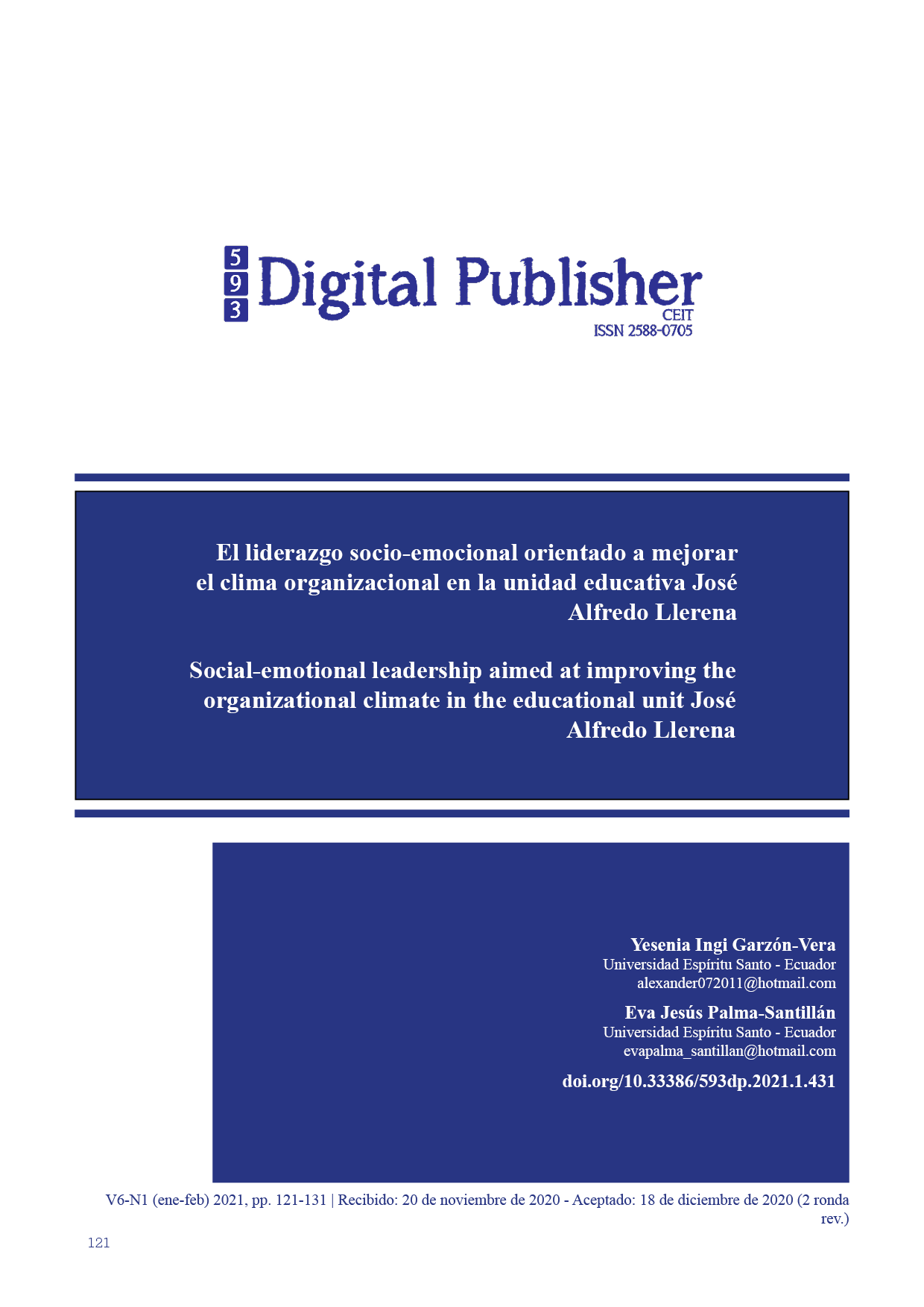Social-emotional leadership aimed at improving the organizational climate in the educational unit José Alfredo Llerena
Main Article Content
Abstract
Managing an institution involves various functions such as directing educators and educators, having effective communication with parents, for this it is essential to possess emotional and professional capacities. Managers should know how to preside over members of an organization, persuade with intelligence and wisdom, that is, they must have good leadership that brings all members to a pleasant organizational climate.
Scientific methods and logical history will be used as they will allow a study with the objectivity that the case requires, it is also emphasized that through methodological techniques and instruments the authors managed to realize the working environment that is presented between the teachers and the authority of the institution.
This article aims to design an action plan to vivify socio-emotional leadership because the leader must strengthen the bonds of friendship and struggle for work. In conclusion, it is intended that managers implement in their action a socio-emotional leadership that brings them to improve the organizational climate of the institutions, providing excellent contexts to the members of their organization and therefore bringing about changes in education.
Downloads
Article Details

This work is licensed under a Creative Commons Attribution-NonCommercial-ShareAlike 4.0 International License.
1. Derechos de autor
Las obras que se publican en 593 Digital Publisher CEIT están sujetas a los siguientes términos:
1.1. 593 Digital Publisher CEIT, conserva los derechos patrimoniales (copyright) de las obras publicadas, favorece y permite la reutilización de las mismas bajo la licencia Licencia Creative Commons 4.0 de Reconocimiento-NoComercial-CompartirIgual 4.0, por lo cual se pueden copiar, usar, difundir, transmitir y exponer públicamente, siempre que:
1.1.a. Se cite la autoría y fuente original de su publicación (revista, editorial, URL).
1.1.b. No se usen para fines comerciales u onerosos.
1.1.c. Se mencione la existencia y especificaciones de esta licencia de uso.
References
Aguero. (2015). La sociología en el comportamiento ambiental. Madrid.
Aragón. (2015). La pedagogía educativa. . México.
Avila, S. M.-N. (2020). Clima organizacional y satisfacción laboral en docentes de las instituciones educativas públicas de la provincia de Pacasmayo, 2019 . Universidad César Vallejo, 8.
Coaquira Tuco, C. (2018). Modelo para la mejorar del desempeño organizacional a traves de la práctica de la gestión . Revista de investigación apuntes universitarios, 60.
Colie, R., Martin, A., & Frydenberg, E. (2017). Social and Emotional Learning: A Brief Overview and Issues Relevant to Australia and the Asia-Pacific. Singapore: Social and emotional learning in Australia and the Asia-Pacific.
Corbella, M. (2016). Liderazgo y responsabilidad educativa: el necesario liderazgo de directores y profesores en la educación. Revista Fuentes, 14.
Díaz Paima R. F. (2017). Clima organizacional y desempeño docente.
Figueroa Orrala, G. A. (2019). Liderazgo directivo y su influencia en la gestión, en una institución educativa, Morrillo, 2017. U. César vallejo, 17.
Galarza. (2010). Problemas teóricos del clima organizacional. Universidad César Vallejo.
Guevara, N. L. (2019). Inteligencia emocional y liderazgo. F C E E, 6.
Hassan, R. S. (2016). Inteligencia emocional y clima organizacional. Tesis de grado. UNIVERSIDAD RAFAEL LANDÍVAR, QUETZALTENANGO.
Laudadío, S. A.-F.-J. (2019). La comunidad escolar como medio para el desarrollo socio emocional. Facultad de Ciencias Biomédicas. Escuela de Educación. Universidad Austral, Argentina.
Li. Hallinger, & Walker, A. (2016). Exploring the mediating effects of trust on principal leadership and teacher professional learning in Hong Kong primary schools. Educational Management Administration & Leadership.
Lussier, & Achua. (2017). Liderazgo, comunicación y trabajo en equipo: la tríada inseparable de una Gestión. dilemas contemporáneos:educación, políticas y valores, 4.
Manosalvas, C., Manosalvas, L. P., & Chafla, A. (2017). Personalidad y liderazgo: análisis teórico de su relación. INNOVA Research Journal.
Montoya Cáceres, P., Bello-Escamilla, N., Bermúdez Jara, N., Burgos Ríos, F., Fuentealba Sandoval, M., & & Padilla Pérez, A. (2017). Satisfacción Laboral y su Relación con el Clima Organizacional. Ciencia & Trabajo. Ciencia & Trabajo, 8.
Nooyi, i. (2012). Performance With Purpose. Retrieved from .
Palomo-Vadillo, M. T. (2013). Liderazgo y motivación de equipos de trabajo. Madrid: ESIC.
Pedraja-Rejas, L.-G. B. (2018). Liderazgo, cultura académica y calidad de las universidades: aproximación conceptual y relaciones . (RVG), 187.
Poves, V. M. (2020). Efecto mediador de la cultura organizacional en la relación entre el liderazgo transformacional y la gestión del conocimiento. Tzhoecoen, 361.
Puglla, L. P. (2020). El liderazgo como herramienta de gestión de calidad en la sociedades mineras:caso Bella Rica. 593 Digital Publisher CEIT, 9.
Sanabria-Boudri, S. F.-F. (2019). Liderazgo directivo, clima organizacional y satisfacción laboral del docente . Revista Interdisciplinaria de Humanidades, Educación, Ciencia y Tecnología, 72.
Taliadorou, N., & Pashiardis, P. (2015). Examining the role of emotional intelligence and political skill to educational leadership and their effects to teachers’ job satisfaction. Journal of Educational Administration.
Young, M. D., Winn, K. M., & Reedy, M. A. (2017). The every student succeeds act:Strengthening the focus on educational leadership. Educational Administration Quarterly.



